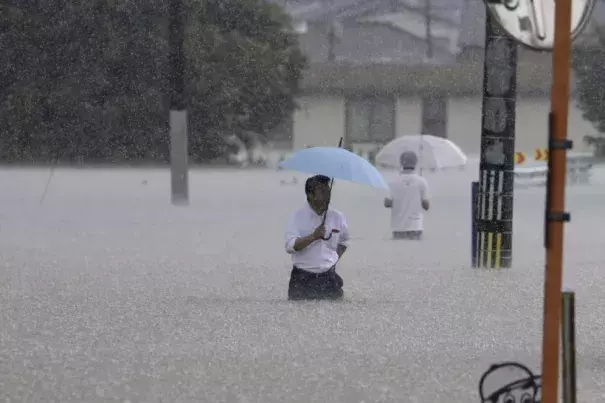Extreme Flooding Kills Dozens in Asia, US

Pakistan, India, Japan, China, and the northeastern U.S. were each battered by torrential rain, heavy flooding, and mudslides in recent days, killing dozens of people. Flash flooding in Northern India from unusually heavy monsoons forced the closure of schools in New Delhi, leaving at least 15 people dead from landslides and flash floods over the past four days. In Pakistan, at least 50 have died since the beginning of monsoon season on June 25. Historic storms on Kyushu, in southern Japan, killed at least three people and left several others missing on Monday. At least 15 were killed, with tens of thousands of people displaced, as heavy rains were accompanied by an unusually prolonged heat wave across China over the last week. And at least one person was killed as intense storms dropping a month’s worth of rain overnight Sunday spawned flash floods in Vermont and New York. Experts say damaging rainfall will become increasingly common as the atmosphere, warmed by the burning of fossil fuels, holds more moisture. The intensity – and the resulting damage – of storms like those wreaking havoc this month is only expected to worsen as the planet warms, often in places that bear little responsibility for the pollution causing climate change. “The bulk of the emissions have come from the industrial Western nations,” Gavin Schmidt, a climatologist and the director of the NASA Goddard Institute for Space Studies, told the Associated Press. “The bulk of the impacts are happening in places that don’t have good infrastructure, that are less prepared for weather extremes and have no real ways to manage this.”
(AP; India: AP, Washington Post $, Times of India, CBS; Pakistan: CBS; Japan: Asahi Shimbun, Washington Post $; China: AP, CNN; New York: Washington Post $, New York Times $, Gothamist; Vermont: NPR, New York Times $, Axios)
(Climate Signals Background: Extreme Precipitation Increase)
To receive climate stories like this in your inbox daily click here to sign up for the Hot News Newsletter from Climate Nexus:


